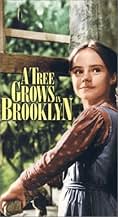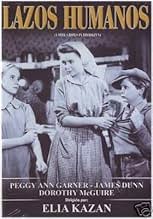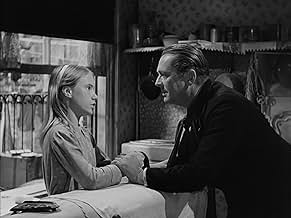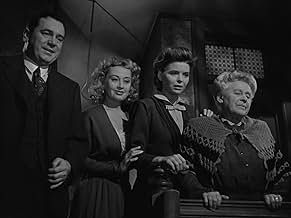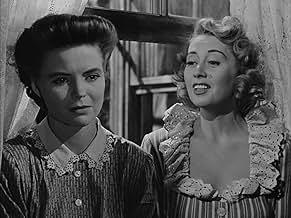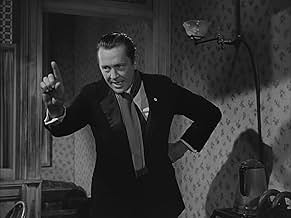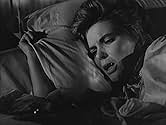अपनी भाषा में प्लॉट जोड़ेंEncouraged by her idealistic if luckless father, a bright and imaginative young woman comes of age in a Brooklyn tenement during the early 1900s.Encouraged by her idealistic if luckless father, a bright and imaginative young woman comes of age in a Brooklyn tenement during the early 1900s.Encouraged by her idealistic if luckless father, a bright and imaginative young woman comes of age in a Brooklyn tenement during the early 1900s.
- 1 ऑस्कर जीते
- 9 जीत और कुल 1 नामांकन
- Augie
- (बिना क्रेडिट के)
- Nurse
- (बिना क्रेडिट के)
- Mr. Creckenbox
- (बिना क्रेडिट के)
- Girl
- (बिना क्रेडिट के)
- Old man on second floor landing
- (बिना क्रेडिट के)
- Grandma Rommely
- (बिना क्रेडिट के)
- Cheap Charlie
- (बिना क्रेडिट के)
- Miss Tilford
- (बिना क्रेडिट के)
फ़ीचर्ड समीक्षाएं
Much of the story centers on a couple of interesting relationships. In both cases they are well-acted, and in both cases the relationships suggest a number of themes worth thinking about. Having these two relationships so well-defined and memorably portrayed raises the movie well above the level of a mere sentimental family story.
The relationship between Francie and her father probably makes the movie, and it is wonderfully acted by James Dunn as the somewhat unsteady but thoroughly endearing father, and Peggy Ann Garner (in one of the finest child performances you will see) as the loyal, intelligent daughter.
Dorothy McGuire plays the important but thankless role of Katie, the stern, dour, yet sincere mother, the kind of role that few actresses can handle well. Katie's relationship with her sister (Joan Blondell) is another of the strengths of the movie. Blondell's flamboyant but sensitive portrayal of Sissy wins all the scenes that she is in, yet McGuire is also essential to making them work and to bringing out the themes implied.
The adaptation to the screen is pretty well-conceived. Naturally, much of the depth is going to be lost when you distill a worthwhile novel into a two-hour movie, but the screenplay highlights some very good material, and if it encourages anyone to read the book, so much the better.
So it's a bit of a surprise that Fox would market a film like A Tree Grows in Brooklyn. The nostalgia is there, but there's a large slice of reality in this film about life growing up in the Williamsburg section of Brooklyn pre World War I. Maybe because a new director, named Elia Kazan who would make his mark directing dramas of social significance was in charge here.
It was his feature film debut as a director, so Darryl Zanuck didn't give Kazan a name cast to work with. Some were up and coming, some were coming back, and some were fading out. Yet the mix was great, not a bad note in the cast.
I also have to say that I liked Kazan's use of the hurdy-gurdy as background music. Rings on Her Fingers and Ciri-biri-bin were never played better.
This was Dorothy McGuire's third feature film and the role of Katie Nolan was hardly a glamorous one. But she's perfect as the mother who keeps her family together, but loses and regains some humanity in the process. She was an underrated actress in her time, always gave great performances and was never fodder for the scandal sheets.
Joan Blondell and James Dunn were respectively cast as McGuire's sister and husband. Blondell, who had sparkled in Warner Brothers musical films and films of social significance was a perfect fit for Aunt Cissy. With this role she transitioned nicely into character roles and never lacked for work.
The career of James Dunn is a puzzle. He was an ex-vaudevillian of good talent who had slipped into B Films by the time A Tree Grows In Brooklyn was made. He won a richly deserved Oscar as Johnny Nolan, singing waiter and would be star. Maybe his dreams outraced his talent, but Nolan had every reason to dream. What's not remembered is that folks who would have been Dunn's contemporaries like Eddie Cantor and Jimmy Durante started out that way. He was a man with the talent, but you need the breaks as well.
Dunn's scenes and relationship with daughter Peggy Ann Garner pivot the film. His character of Johnny Nolan is not unlike Gaylord Ravenal in Showboat if he had stayed around until his daughter was beginning adolescence. That Oscar should have revived Dunn's career, but didn't. He had very much the alcohol problem that his character in the film had. Ironically he's remembered today for supporting Shirley Temple in three of her films in the thirties than this Oscar winning, best supporting actor performance. But maybe those films were good training for this role. Neither Dunn nor Garner upstage the other.
The best acted scene in the film is when McGuire goes into labor and Garner is the only one around. Back in those days before medical insurance, people had their babies at home and infants died, due to lack of good post-natal care. In fact prior to this scene, Joan Blondell cashes in an insurance policy so she can splurge on the cost of a hospital because previous infants of her's had died.
Garner is a bright girl and her father encouraged her to dream big as he did. She was daddy's little girl and her relationship with mom was not all it should have been. As mom goes into labor and they wait for Blondell to arrive, they start confessing to each other. Garner realizes the sacrifices mom has made and McGuire realizes how much she's stifled her daughter's dreams. It's a wonderfully played scene and you're made of stone if it doesn't affect you.
Rounding out the cast is Lloyd Nolan as the neighborhood beat cop, James Gleason as a tavern owner and Ted Donaldson as Garner's younger brother. I should also mention that Peggy Ann Garner got an honorary Oscar as most promising juvenile performer of 1945. She had a decent career, but nothing ever as good as A Tree Grows In Brooklyn.
`A Tree Grows in Brooklyn,' from Betty Smith's poignant novel, is able to capture the essence of the author's words not only because of its trenchant
writing, but because of three remarkable, beautifully-realized performances. Peggy Ann Garner offers one of the most astonishing child performances ever, finding the very spirit of this 12-year-old child going on 21. Blessed with one of the most expressive faces witnessed on camera, her eyes are sheer poetry and alone speak volumes as Francie, a young girl devoted to her ailing, debilitating father and brutally distant from an unnurturing mother she partially blames. It is such a complete performance. Her steadfast growth in this film is beautiful to observe as she begins to spread her branches and assume her rightful place in life sooner than expected. Garner is simply unforgettable.
James Dunn, as Jimmy Nolan, leaves an indelible impression as the amiably charming ne'er-do-well, a solitary dreamer who has frittered his life away, as well as his family's money. Despite the cruelties of his actions, your heart aches for this man. His touching scenes with daughter Francie reveal his innate goodness and its heart-wrenching to watch him dissolve before your very eyes. Even a treasured bond with his idolizing daughter isn't enough for him to fight hard enough to forego the liquor bottle and regain his place at the head of the table. It is an unbearably sad decline, one that haunts you long after the picture is over. Both Dunn and little Peggy Ann would never find movie roles like these again, and earned well-deserved Oscars (Peggy actually copped a 'special juvenile' award) for their work here.
In an exceptionally careful and astute performance, Dorothy McGuire plays the necessary heavy here, the taciturn, seemingly cold-hearted matriarch Katie Nolan, who is also this family's hope and salvation. Unable to trust her husband or afford him the time and patience he desperately needs, she has ultimately abandoned her love for him out of necessity, what with two children and a third on the way, and no viable means to support them. Ms. McGuire, in a career best performance, serves up a somber, beautifully restrained portrait of a flawed, modest, uneducated, somewhat ignoble woman handling life the only way she knows how, and expecting little in return. McGuire, who was only 27 at the time this was filmed, easily nixes any comments that she is too young for the part by displaying a strong, careworn maturity well beyond her years.
Joan Blondell, as only Joan Blondell can, puts some oomph in the drab and dreary proceedings as Katie's gregarious sister, Sissy, who juggles husbands in her ever search for the right man, and earns the scorn of the town in her reckless, law-breaking pursuit. Blondell manages to give the film a breath of fresh air everytime she appears, though her character's development is choppy in its transition. Her story, unfortunately, gets lost midway and never truly kicks back in. Little Ted Donaldson as younger brother Neeley contributes fine work also, but is another victim of the primary focus the film decides to takes -- Garner's Francie is rightfully the heart and soul of the piece and she is quite up to the task.
Despite being robbed of a best picture that year (I mean, really, "Anchors Aweigh" and "Mildred Pierce" were nominated over it??) and the fact that Ms. McGuire was overlooked completely, it is slowly earning the attention it deserves. It should be in the top "20" of anybody's movie lists. For me, this movie is most effective come the yuletide season. It is that touching and meaningful.
The 1974 TV-remake of "A Tree Grows in Brooklyn" starring Cliff Robertson and Diane Baker is a mere sapling compared to this giant oak of a film.
क्या आपको पता है
- ट्रिवियाAfter being so impressed by the dailies of the film, executives at Fox wanted to re-shoot the entire movie in Technicolor, but Elia Kazan refused.
- गूफ़The portrait of General Washington in Francie's classroom was issued nationwide to public schools and buildings in 1932 to mark the bicentennial of his birth. The chronology of the story has events taking place at least 20 years earlier.
- भाव
Francie Nolan: Out the window, our tree they killed it!
Johnny Nolan aka The Brooklyn Thrush: Well, would you like at that now.
Francie Nolan: They didn't have any right to kill it did they papa!
Johnny Nolan aka The Brooklyn Thrush: Now wait a minute. They didn't kill it. Why they couldn't kill that tree.
Francie Nolan: Promise?
Johnny Nolan aka The Brooklyn Thrush: Why sure baby. Don't tell me that tree is gonna lay down and die that easily. Look at that tree. See where it's coming from. Right up outta that cement! Didn't nobody plant it. Didn't ask the cement to grow. It just couldn't help growing so much it just pushed that old cement out of the way. Now when you bust it with something like that, can't anybody help it, like... like that little ole bird up there. He didn't ask anybody could he sing and he certainly didn't take any lessons. He's so full of singing it just has to bust out someplace. Why they could cut that ole tree right down to the ground and a root would push up someplace else in the cement.
- कनेक्शनFeatured in Elia Kazan: A Director's Journey (1995)
- साउंडट्रैकI've Got Rings on My Fingers (Mumbo Jumbo Jijjiboo J. O'Shea)
(1909) (uncredited)
Music by Maurice Scott
Performed by a calliope
टॉप पसंद
- How long is A Tree Grows in Brooklyn?Alexa द्वारा संचालित
- What is 'A Tree Grows in Brooklyn' about?
- Is 'A Tree Grows in Brooklyn' based on a book?
- What does a 'tree' have to do with the story?
विवरण
- रिलीज़ की तारीख़
- कंट्री ऑफ़ ओरिजिन
- भाषा
- इस रूप में भी जाना जाता है
- Lazos humanos
- फ़िल्माने की जगहें
- उत्पादन कंपनी
- IMDbPro पर और कंपनी क्रेडिट देखें
- चलने की अवधि2 घंटे 9 मिनट
- रंग
- पक्ष अनुपात
- 1.37 : 1
इस पेज में योगदान दें




